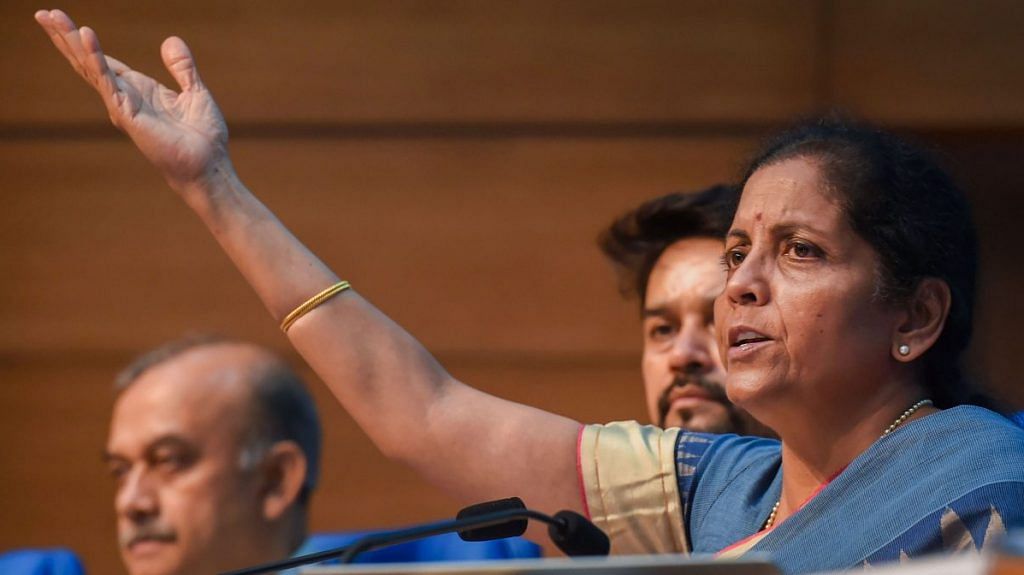Finance Minister Nirmala Sitharaman has announced a series of measures to revive the economy. Some measures in the list announced by her will alleviate some of the pain caused by the budget, others will address the liquidity situation and put money in the hands of companies. These will help give some relief to the economy. But is this adequate, or are there long-term issues that need to be addressed to put the economy on a path of high growth and ensure an increase in productive employment?
There are three key takeaways from the finance minister’s announcements.
First, the economic crisis is deepening. It was therefore necessary to take some steps. Second, the government is listening. This is a refreshing change. Third, perhaps the government believes these steps will put the economy back on track. Hopefully this is just the beginning of a process and these steps will be followed by structural reforms that put the economy on a long-term, sustainable growth path.
The finance minister rolled back the tax on foreign portfolio investors (FPIs), which was meant for the super-rich, but imposed, most probably not by intent, on those registered as non-corporate entities. The exit of FPIs from the Indian stock market and the fall in the market rang alarm bells. It is good news that the government listened to the markets and rolled back the tax. This should be the first step towards an examination of the tax system in India.
Stimulus is temporary
With its high rates, many exemptions and low tax compliance, the government needs to examine whether the present tax system and the way it is administered acts as a hindrance to growth. It needs to ask whether decades of leaving the system unreformed has given way to a rot in the system and whether that needs to be addressed. A stimulus can only be temporary and can only be given for a short while. A clean-up and reform of the system meant to remove the obstructions that are placed by the bureaucracy on honest citizens and the private sector have the potential to spur growth and development in the long run.
GST was enacted to reform the indirect tax system. It may still have difficulties but they are being addressed. The Direct Tax Code was meant to do away with exemptions, reduce tax rates and clean up the direct tax system to improve compliance while reducing the discretionary power of tax officials. The corporate tax rate was to be cut. It needs to be brought back on the reform agenda as soon as possible.
While on paper the government stuck to the FRBM targets in the budget, it was later revealed that large borrowings by public sector enterprises had actually hidden a part of the deficit. To put the economy on a higher growth path, the government needs to take the bold step of putting an end to the continuous drain on its resources caused by loss-making public sector enterprises.
Also read: Modi 2.0 needs to undo the damage done to the economy by UPA & his own first term
Get out of business
Disinvestment or privatisation of public sector enterprises is important not only because many like Air India act as a regular drain on the exchequer, but because resources are better allotted in the economy when they are put to more productive uses. Many profit-making enterprises are doing much worse than their private counterparts. It is time the government got out of those activities that are not the core functions of the state. Running hotels, airlines, telecom companies and steel companies are some of them.
Public sector banks were nationalised by Indira Gandhi in an attempt to control the capital and savings of households in the economy. After liberalisation of the economy, they continued to dominate India’s banking and financial sector. Year after year the government bails out these banks or re-capitalises them. This drain on the economy is paid for by the tax payer. Banks still don’t give adequate credit and no one is ever sure whether they exist to carry out the political agenda of a government or to provide financial inclusion to the population, something they never do satisfactorily.
Indian tax payers foot the bill for a large government, an inefficient and corrupt public sector and an inefficient banking system. As they continue to support the burden of these year after year, tax rates are raised, honest tax payers are harassed and yet budget estimates of tax targets are not met. The system is not sustainable.
The rollback of the tax on FPIs and the surcharge on capital gains tax are very good, but they only undo the wrong done in this year’s budget. They do not undo the wrongs done in the decades before this budget. Sitharaman has done well. It takes courage to accept mistakes and undo them. She now needs to take this process forward, and not merely undo her own mistakes, but those of her many predecessors.
The author is an economist and a professor at the National Institute of Public Finance and Policy. Views are personal.
Also read: India’s economic crisis has only one root cause
